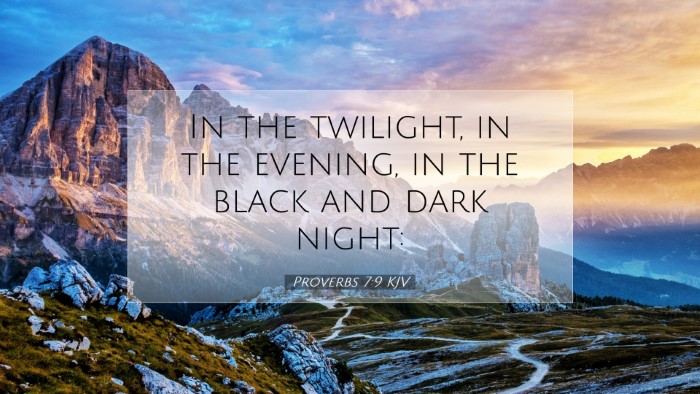Proverbs 7:9: "In the twilight, in the evening, in the black and dark night."
Introduction
This verse from Proverbs captures a moment of potential moral danger and sets the stage for the teachings regarding wisdom and temptation. It reflects the broader themes within Proverbs regarding the importance of discernment and the pursuit of righteousness in an environment filled with allurements. Public domain commentaries such as those of Matthew Henry, Albert Barnes, and Adam Clarke provide deep insights into the implications of this solitary verse.
Verse Context
The context of this verse situates it within a warning against the seductiveness of adulterous relationships. It underscores the danger that lies in the cover of darkness, a metaphor often associated with sin and moral failing. The progression of thought emphasizes vigilant watchfulness against the pitfalls of temptation, which can arise when one's guard is down.
Matthew Henry's Insight
Matthew Henry's commentary elucidates the significance of the timing mentioned in this verse. He elucidates that the “twilight” and “evening” signify a time when darkness begins to encroach upon the light — a symbol for the gradual onset of moral decline. Henry points out that the “black and dark night” paints a vivid picture of spiritual peril where confusion reigns and the mind is more susceptible to temptation.
Henry remarks that this specific timing indicates a season for readiness, as it often reflects a state of mind that is relaxed and unguarded. He asserts that individuals are more likely to fall into temptation during times of complacency, thus reinforcing the necessity of spiritual vigilance, especially in morally ambiguous situations.
Albert Barnes' Commentary
Albert Barnes adds another layer to the interpretation of this verse. He connects the phrase “twilight” with moments when decisions can be made either towards righteousness or sin. He emphasizes that it is during these transitional phases of the day (and metaphorically in life) that one must exercise caution and prudence.
Barnes notes that the portrayal of nighttime can reflect the inherent danger of illicit encounters, and it serves as a metaphor for the complete surrender of one's moral compass. He also mentions that this observation aligns with the cautionary nature of wisdom literature found throughout Proverbs, which strives to equip the reader with the discernment needed to navigate the shadows of temptation.
Adam Clarke's Perspective
Adam Clarke highlights the psychological implications embedded in this verse. He perceives the mention of a “dark night” as indicative of not just physical darkness, but also moral and spiritual darkness where clarity is obscured. Clarke views such environments as breeding grounds for moral compromise and calls for a heightened level of spiritual awareness.
Clarke refers to the tendency of individuals to become more susceptible to wrongdoing when they are in isolation or darkness and stresses the importance of accountability among believers. He argues that the community should serve as a protective barrier against moral failures that often emerge in secret or hidden circumstances.
Theological Significance
This verse invites deeper theological examination concerning the nature of temptation and the human experience. As established in the commentaries, the imagery of twilight and dark nights serves as a poignant reminder that spiritual awareness is essential in every stage of life. The potential for unfaithfulness is not just an action; it’s often preceded by a neglect of spiritual discipline.
- Moral Vigilance: The necessity of remaining vigilant and aware of one's surroundings and internal state.
- Community Accountability: The importance of being in a community that fosters righteousness and guards against temptation.
- Grace and Redemption: While the dangers are real, the Scriptures continuously offer hope and redemption for those who falter.
Application for Pastors and Theologians
For pastors and theologians, Proverbs 7:9 serves as an essential text for sermon preparation and teaching on ethics and morality. This verse can be particularly useful when addressing topics of temptation, integrity in personal and professional relationships, and the importance of maintaining a life of purity.
- Preaching on Vigilance: Use this verse to inculcate a spirit of vigilance among congregants, highlighting the times and places where they may be more susceptible to temptation.
- Teaching on Morality: Encourage discussions on how to navigate relationships and situations that could compromise their moral integrity.
- Supporting Biblical Literacy: Promote the understanding of Proverbs as a practical guide to daily life, equipping congregants with wisdom for real-world challenges.
Conclusion
In summary, Proverbs 7:9 encapsulates a vital warning about the potential perils of temptation and the necessity of maintaining vigilance in a world rife with moral challenges. The insights from Matthew Henry, Albert Barnes, and Adam Clarke underscore the community’s role in spiritual accountability and the need for constant spirit-led discernment.
This verse, while seemingly simple, serves as a profound reminder of the consequences of our choices and the importance of pursuing a life of integrity amidst life’s inevitable shadows.


